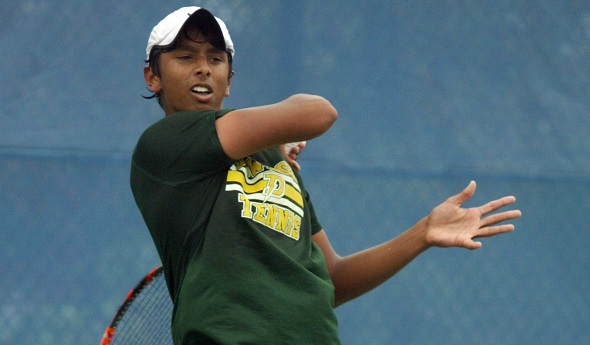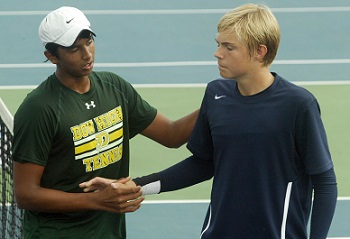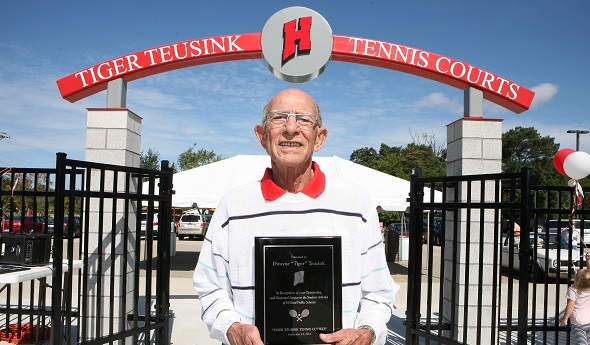
Performance: Dow's Varun Shanker
October 20, 2016
 Varun Shanker
Varun Shanker
Midland Dow senior - Tennis
Shanker finished an incredibly successful and in ways unprecedented career Saturday by winning the No. 1 singles championship at the MHSAA Lower Peninsula Division 2 Final while leading the Chargers to their first team championship since 2013. Shanker became the first No. 1 singles champion for his school's prestigious program since 1999 and finished 32-1 this season in earning the Michigan National Guard “Performance of the Week.”
This was Shanker’s third season at No. 1 singles; he also won No. 3 singles as a freshman as Dow earned a fifth straight Division 2 team title. The next fall, Shanker became the first sophomore captain in Chargers history, and as a sophomore and junior he made the Division 2 semifinals at the top flight. But this fall was special; Shanker’s only loss was to Birmingham Groves’ Gabe Liss, who Shanker came back to beat two weeks later, and total his season sheet included victories over four of the top-six seeded players in Division 2 and three of the top five at the Division 1 Final including eventual champion Steven Forman of Troy. Shanker had 11 wins over players considered among the top 100 in their age groups in the Midwest, including a 7-6 (6), 3-6, 7-6 (8) nail-biter over Kalamazoo Loy Norrix freshman Reed Crocker in Saturday’s championship match. Shanker finished 115-19 over his four varsity seasons.
 Shanker followed into the program his brother Vikram, a 2014 graduate who remains tied for second in MHSAA history with 132 career doubles wins and who was named an MHSAA/Farm Bureau Scholar-Athlete Award winner as a senior. Similarly, Varun has a 4.0 grade-point average (4.79 weighted) and is a National Merit Scholarship semifinalist. He’s been part of teams that have won three first-place A.H. Nickless Innovation Awards and a total of $135,000 in scholarship and grant money for work in water purification by electrodialysis, piezoelectric devices and microbial fuel cells. He’s contemplating studying biomedical engineering as he considers opportunities for academics and tennis at the next level.
Shanker followed into the program his brother Vikram, a 2014 graduate who remains tied for second in MHSAA history with 132 career doubles wins and who was named an MHSAA/Farm Bureau Scholar-Athlete Award winner as a senior. Similarly, Varun has a 4.0 grade-point average (4.79 weighted) and is a National Merit Scholarship semifinalist. He’s been part of teams that have won three first-place A.H. Nickless Innovation Awards and a total of $135,000 in scholarship and grant money for work in water purification by electrodialysis, piezoelectric devices and microbial fuel cells. He’s contemplating studying biomedical engineering as he considers opportunities for academics and tennis at the next level.
Coach Terry Schwartzkopf said: “As Dow’s only three-year captain in history, Varun demonstrated the character, drive, determination, and dedication needed in order to claim a championship. In terms of community, he has organized beautification projects within Midland and participated providing free tennis clinics in the tri-cities. He has handled grant applications for team income, ordered inventory including uniforms and warm-ups, and handled media relations. As for athletics, we have had talented teams who won championships based on the depth of talent. This year, it was based upon work and improvement. Varun spent the offseason corralling kids, encouraging them to train, and even offering rides when needed. During season, he would work daily with players individually, deconstructing and rebuilding pieces of their game. He ... worked more as an assistant coach than a player. Varun unified, inspired, and took players to task when needed. He had no issue calling out players due to lack of effort and praising those who worked hard. In 17 seasons as a coach, Varun is without a doubt the strongest captain I have ever had. There was never a single time in four years where I questioned his loyalty to the program, his drive to succeed, or his willingness to give all he had to help his team succeed. In fact, I have never wanted a player to win a championship more than him because that was never his focus. From the beginning, his focus was team. He was content that if he played his best he would be satisfied with his outcome, provided the team was successful."
Performance Point: “Coming into the tournament as the one seed, there’s always a little pressure,” Shanker said. “For me, this year was different. This year, I knew, was my chance, that I could do something special. That I could fulfill my dream of always winning the one singles position. I knew I’d have tough opponents to play in the tournament, but I definitely came in with a focused mindset, and obviously it’s tough to not reflect on that last match, those last few points. … I was down two match points, and he literally needed one point to win twice. I want to say my back was against the wall; that’s as close as it’s going to be. To me, it was about believing. I saw my teammates cheering for me; I saw my coach. I saw it was (about) way more than one match, but all the support, and I was able to find it in myself to get a little bit tougher and mentally to be able to pull it out. The support was unbelievable.”
Dow dynasty: “It’s been unbelievable. We had a tradition of excellence here when I came in as a freshman; we had won four consecutive state titles. When I finally joined the team freshman year, I was finally able to understand why it’s like that. Coach instills hard work and preparation, and that was the reason we were able to achieve that. As my career progressed, I was able to learn what some of the things are that are able to make us successful, what some of the things lead to. During my four years, we had a lot of ups and downs – that’s definitely fair to say. My sophomore year, actually, we were supposed to win the state title (Dow finished third). It was a little bit of a letdown to walk away, but that definitely fueled the next few years. We learned how to get back up and dust ourselves off.”
 Vikram’s lead: “My brother has had the biggest impact on my life, sports, academics – pretty much every facet of my life, and I do credit him for a lot of this. Growing up, the first reason I picked up a tennis racket was him. I was always big into swimming, but ever since he picked up a racket, I followed suit. He’s a great supporter and has always been a great coach for me.”
Vikram’s lead: “My brother has had the biggest impact on my life, sports, academics – pretty much every facet of my life, and I do credit him for a lot of this. Growing up, the first reason I picked up a tennis racket was him. I was always big into swimming, but ever since he picked up a racket, I followed suit. He’s a great supporter and has always been a great coach for me.”
Name on the shirt: “High school tennis always has been one of my most favorite parts of the year. Being able to combine the team element to (tennis), it’s hard to describe, but it really enhances it being able to share the process with a group of teammates, both practice and competition. It truly does become a team sport. Representing my school and the community has been a favorite part of high school, rather than just playing as an individual on the USTA circuit. The community in Midland has helped us a lot in becoming great athletes, especially the Midland Tennis Center. Being able to represent playing for my school, it allows me in a certain way to represent the great things they’ve helped us (accomplish).”
Dr. Shanker: “I’m not sure whether I want to go into biotechnology; I definitely always have aspired to be a doctor. I just love that being a doctor, you’re able to help people, but you’re also on the cutting edge of science. That always has been really intriguing to me.”
- Geoff Kimmerly, Second Half editor
Every week during the 2016-17 school year, Second Half and the Michigan National Guard will recognize a “Performance of the Week" from among the MHSAA's 750 member high schools.
The Michigan Army National Guard provides trained and ready forces in support of the National Military Strategy, and responds as needed to state, local, and regional emergencies to ensure peace, order, and public safety. The Guard adds value to our communities through continuous interaction. National Guard soldiers are part of the local community. Guardsmen typically train one weekend per month and two weeks in the summer. This training maintains readiness when needed, be it either to defend our nation's freedom or protect lives and property of Michigan citizens during a local natural disaster.
Previous 2016-17 honorees:
Oct. 13: Anne Forsyth, Ann Arbor Pioneer cross country – Read
Oct. 6: Shuaib Aljabaly, Coldwater cross country – Read
Sept. 29: Taylor Seaman, Brighton swimming & diving – Read
Sept. 22: Maggie Farrell, Battle Creek Lakeview cross country – Read
Sept. 15: Franki Strefling, Buchanan volleyball – Read
Sept. 8: Noah Jacobs, Corunna cross country – Read
PHOTOS: (Top) Midland Dow's Varun Shanker follows through on a return during his No. 1 singles championship match Saturday. (Middle) Shanker shakes hands with Loy Norrix's Reed Crocker after securing the title. (Click to see more from HighSchoolSportsScene.com.)

Holland Courts Honor Program Builder
By
Geoff Kimmerly
MHSAA.com senior editor
October 5, 2016
A few days after he stood in front of a group of admirers including friends, fellow coaches and former players – including some from his first Holland High School tennis team in 1972 – Dwayne “Tiger” Teusink drove past the courts that now bear his name.
It’s a welcoming sight honoring someone who has welcomed thousands though the sport over more than a half century as a coach and administrator.
Teusink, a 1954 graduate of Holland High and later Hope College, coached high school tennis at Jackson for seven years and then Holland for 35 while also lending a significant behind-the-scenes voice in the formation of high school tennis as it’s played in Michigan today.
He was recognized for those and many more contributions during the Dutch’s Homecoming weekend Sept. 24 as reportedly more than 200 attendees cheered the renaming of the 5-year-old Holland High facility as the “Tiger Teusink Courts” in honor of the longtime teacher, athletic director and coach.
“The whole experience was overwhelming,” Teusink said Tuesday. “Our facility is a first-rate facility. Holland has always had a great tennis program. The community supports tennis, and this facility obviously belongs to the community, but it makes me really proud that my name is associated with it.”
He’s been associated with most of the foundation-setting of the sport both locally and statewide over the last five decades.
After his time at Jackson High, Teusink returned home to Holland in 1972 and continued as a teacher until 1989 and coach until 1998. He led high school teams to a 453-176-4 record with 13 conference and 16 MHSAA Regional titles, and his Holland boys team was a runner-up at the 1976 Class A Final. He also coached at Hope College from 1994-2009.
At a statewide level, Teusink’s work has affected thousands more. He was on the committee that in 1976 introduced the flighted MHSAA tournament structure developed to promote a team format that remains the standard today. While at Holland, Teusink managed 63 Regional and 17 MHSAA Finals tournaments, and he served on the Finals seeding committee from 1980-2011.
He continues to serve on the MHSAA tennis committee that annually considers rules changes and other business that pertains to the sport. He also has played a major role in the development of the Michigan Interscholastic Tennis Coaches Association, and held offices of president, vice president and secretary/treasurer over a 32-year span.
“He was a mentor to me on how to not only to teach the game, but more importantly teach kids the right way to compete and to enjoy the sport,” said Grand Haven Lakeshore Middle School principal Kevin Polston, who coached tennis at DeWitt from 1999-2002 and then both Buccaneers varsities from 2003-08, and served with Teusink on the MHSTeCA board. “I respected that he always stood for what was right, even if it wasn't easy. You always knew where Tiger stood on something, and he could clearly explain why he came to the conclusions he did. Quite simply, when Tiger spoke, people listened.”
Kevin O’Keefe played four seasons for Teusink before graduating in 1986 and has heard from a number of other alums how their coach was ahead of his time.
As the current Dutch coach since 2008, O’Keefe inherited the “big binder bible” of Teusink’s lesson and practice plans that also contains his mentor’s thoughts on everything from conducting challenge matches to motivating players and working with parents.
“He’d come every day with a plan in mind and with an agenda,” O’Keefe said. “The logistics of how it works still work. A lot of it is still quite relevant.”
Other ways Teusink has become memorable and respected over the years are not known by many. His players always knew that being on time meant being five minutes early, and Teusink would have practices start at odd times like 3:14 or buses leave at 6:54 so his players wouldn’t forget. Polston received the mentor’s help one year running Grand Haven’s league tournament – and marveled at how Teusink allowed players to pick on which court they played, and then also kept track to make sure each school got to pick a court the same number of times.
A more significant philosophy surely benefited hundreds who have played for him. Teusink’s was a no-cut program; his teams regularly numbered 45-50 athletes. “That simply enhanced the things we did to teach teamwork, team discipline, belonging to a team and so on,” Teusink said.
Teusink earned induction into the Michigan High School Tennis Coaches Association Hall of Fame in 1986, the Michigan High School Coaches Association Hall of Fame in 1989 and the National High School Athletic Coaches Association Hall of Fame in 2003. He was named National High School Coach of the Year by the United States Tennis Association in 2005, receiving his award at the U.S. Open.
Teusink captained the Hope College men’s basketball team during the 1957-58 season for Russ DeVette, who taught Teusink much about "simply coaching, how to deal with people." Teusink’s first mentor was Joe Moran, who preceded Teusink as Holland’s tennis coaching legend and is the namesake of one of the city’s public parks and tennis courts.
And just as Teusink drove by the sign bearing his name last week, he’ll surely visit more in the future as he remains a sounding board both for his former player and many tennis decision-makers in our state.
“He comes to probably 2-4 matches a year. We stay in touch. I still call him for things,” O’Keefe said. “He’s always there, always ready to answer a question, give advice.”
PHOTO: Tiger Teusink stands with the plaque presented to him Sept. 24, when the Holland High School tennis courts were renamed in his honor. (Photo courtesy of the Holland athletic department.)

